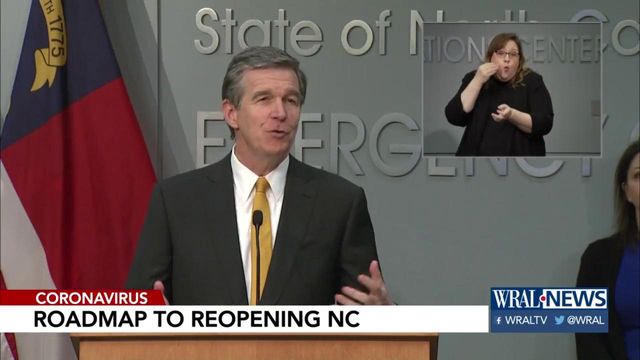Cooper lays out benchmarks to reopen NC's economy, get to 'new normal'
Gov. Roy Cooper on Wednesday outlined some of the things the state along with local governments would need to do to get the economy restarted and to help everyone return to a "new normal."
Posted — UpdatedCooper said the state must meet the following measures:
- Expanded testing capacity to determine the extent of the coronavirus in the state
- More public health workers to be able to trace the contacts of all infected people
- Improved trends in terms of the number of cases, hospitalizations, deaths, the availability of personal protective gear and other measures
Cooper put a statewide stay-at-home order in effect on March 30, resulting in the closure of businesses ranging from movie theaters to barber shops, and he tightened restrictions on retailers that remain open on Monday, forcing them to limit the number of customers inside at any given time.
"Our efforts to flatten the curve [of infections] are working, and that means we have saved lives," Cooper said during a Wednesday news conference. "But we know our current situation is not sustainable in the long run. We can't stay home forever."
Nearly 600,000 people have filed for unemployment benefits with the state since mid-March, with about 90 percent of the claims coming from virus-related shutdowns, according to state Department of Employment Security statistics.
Cooper said, however, that data needs to be examined to determine how and when to reopen businesses.
"We want to get back to work while, at the same time, preventing that spike that will overwhelm our hospitals with COVID-19 patients," he said, describing a "dimmer switch" that will be adjusted instead of flipping the economic switch back on after weeks of being off.
The state Department of Health and Human Services is already assembling public- and private-sector partners to expand the state's testing capacity. DHHS Secretary Dr. Mandy Cohen said self-administered tests are in development, which could reduce the need for health care workers to don masks, gowns and gloves to conduct each test.
Tracing the contacts of infected individuals to contain potential outbreaks "requires a lot of people and a lot of legwork," Cooper said. DHHS is working with universities and hospitals statewide to expand the public health workforce to accomplish more tracing, Cohen said, and state officials are looking at "digital tracing" options.
"We need to understand how COVID-19 is impacting our state and impacting specific regions and populations," she said, noting data scientists are working on North Carolina-specific statistical models to get a better handle on how the virus is moving through the state.
Even after restrictions are eased, efforts must be made to protect seniors and others from the virus, Cooper said, noting that a vaccine isn't likely to be available for another year or so.
"In our new normal, you may see more people wearing masks or having their temperature checked," he said. "A restaurant you may go into may have tables that are only partially full. The only sporting events or concerts that you may be able to watch for a while may have no in-person crowds."
Cooper said counties can continue to set stricter guidelines for reopening their local economies, but the state needs to set the floor for minimum requirements.
"A new normal may get us back to work, back to school and back to play, but in a new way," he said. "To protect our health and long-term economic prosperity, we have to act with care and not in haste."
• Credits
Copyright 2024 by Capitol Broadcasting Company. All rights reserved. This material may not be published, broadcast, rewritten or redistributed.






